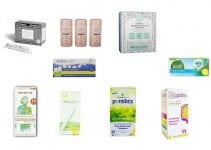It is always best to maintain a healthy diet in order to get the necessary vitamins and minerals.
However, you could still be missing out on some key nutrients even if you are eating healthy.
Navigation:
- Benefits of Prenatal Vitamins
- Tips for Choosing the Best Prenatal Vitamin
- Best Prenatal Vitamins
- When To Start Taking Prenatal Vitamins
If you are pregnant or trying to get pregnant, the prenatal vitamins can be helpful in filling any gaps. Prenatal vitamins are vital for you to have a healthy pregnancy and baby, but it can be daunting to know which one to choose and when to take them.
If you need help, the following article has tips for choosing the best prenatal vitamin.
Prenatal vitamins usually have more iron and folic acid than the standard multivitamins for adults. There are good reasons for this as the folic acid will help to prevent the baby from neural tube defects [1][2], while iron supports development and growth, as well as help to prevent anemia.
Some Benefits of Prenatal Vitamins
You can enjoy a number of benefits if you are taking a prenatal vitamin daily before trying to get pregnant. It can help to:
Boost fertility: This vitamin will help to ensure a healthier baby, as well as increase your chances of making that healthy baby a lot faster.
Reduce nausea: Research shows that women experience fewer bouts of vomiting and nausea in the first trimester when they take daily multivitamin prior to getting pregnant and/or throughout the first weeks of pregnancy.
Lower the risk of birth defects: The most important reason to take prenatal vitamins is for the benefits of folic acid. Studies have shown that the neural tube defects risk in developing babies will be reduced significantly if women get enough of this nutrient before the sperm reaches the egg and during the early periods of pregnancy.
In addition to the above, some research shows that prenatal vitamins can reduce the risk of you giving birth to a baby who is very small for his/her gestational age.
Tips for Choosing the Best Prenatal Vitamin
There are many prenatal vitamin supplements available on the market, including over-the-counter in almost every pharmacy.
Since your individual needs might differ, it would be a good idea to work directly with your medical doctor to determine the best prenatal vitamin plan.
Your healthcare provider may recommend that you use a specific brand or leave this decision up to you. In the meantime, the following tips can help you to choose the best prenatal vitamin.
You should carefully examine the label of the prenatal vitamin that you are considering to ensure a few vital vitamins are included. In general, you should look out for a prenatal vitamin with:
Folic acid: The neural tube of a baby develops during the first month of pregnancy, even before many women find out that they are pregnant, so it is ideal to take your prenatal vitamin supplement before trying to conceive.
In addition to having a lot of folate-rich foods in your diet, you need a vitamin that contains a minimum of 600 mcg of folic acid during your pregnancy.
If your family history is showing a high risk of babies having neural tube defects, then the recommendation is for you to take four mg or ten times that amount. You can discuss this with your doctor beforehand.
Calcium: This nutrient is especially vital when you are expecting a baby, but every woman between nineteen and fifty needs 1,000 mg daily.
You can get a lot of calcium from yogurt, milk, or other calcium-rich items, but some must be in your prenatal vitamin supplement. Your doctor might recommend additional supplement if he or she believes that you are not getting enough.
For women who are expecting, they are required to take in 1,200 to 1,400 milligrams every day. However, you need to consult your doctor to be sure that you are also not getting so much from what is needed.
Why? It is because when you are taking in too much calcium, your body may not be able to absorb minerals effectively. It may also cause constipation and the risk of you getting kidney stones will be higher.
But with the right amount of intake, pregnant women who are taking the correct amount of calcium supplements will deliver a baby that has a bone mineral content of 15% more.
There is also a lower risk of preeclampsia when a pregnant woman takes in 1,500 milligrams of calcium per day. It is best if you take these supplements during your second and third trimester.
Iron: This mineral is considered the building block of a baby’s cells, but it is also necessary for your body during pregnancy. Your doctor might recommend a higher dosage if you are anemic throughout pregnancy, like many women.
Even if you are not pregnant yet, the body already needs iron because it is necessary to make hemoglobin, which is in charge of carrying oxygen to other cells. Other essential functions of iron include the production of collagen, myoglobin and different enzymes.
Myoglobin is a type of protein that aids in supplying oxygen to muscles of the body and collagen is a protein that can be found in the cartilage, bones and other connective tissues. Aside from that, regular intake of iron will help in ensuring that your immune system is healthy.
So for those expecting mothers, iron intake is even more important because not only will it help in maintaining a healthy immune system for your body but also to that of your baby. Iron is an essential mineral for pregnant women because the needed blood in your body will increase.
You need to get as much as 50% more of blood than usual and iron will help by producing additional hemoglobin. [3]
The growing placenta and baby will also need extra iron most especially during the 2nd and 3rd trimesters of your pregnancy.
On top of that, an additional amount of iron is required if you have insufficient levels before getting pregnant.
If you have iron deficiency anemia, there’s a higher possibility of delivering earlier than the proper schedule or giving birth to a baby with low weight. What’s even worse is the likelihood of infant mortality just because you lack the right amount of iron.
In addition, you could benefit from a prenatal vitamin that has Vitamin A, C, D, E, and B6, copper, and zinc.
Vitamin B6: You need 1.9mg of B vitamin to help lower the potential for nausea and vomiting or morning sickness.
Also, it has been proven that there is no harm to the baby when a pregnant woman takes vitamin B6. But be sure to talk to your doctor first so that you will be given the right dosage.
Typically, the recommended dose will be from 10 mg to 25 mg and should be taken thrice a day for reducing and/or eliminating morning sickness.
Aside from preventing morning sickness to a pregnant woman, Vitamin B6 (also called pyridoxine) can help in developing a baby’s nervous system and brain.
Plus, the baby will be able to metabolize carbohydrates and protein more effectively as well as with your own body.
Protein can be easily digested and new antibodies, neurotransmitters, and red blood cells can be aided for better formation.
But be also aware that taking more than 100 mg a day may lead to temporary nerve damage so always talk to a health professional before taking any vitamin B6.
Depending on your circumstances, the healthcare provider may also recommend higher doses of specific nutrients.
As an example, a different supplement with a higher dosage of folic acid might be recommended prior to and during subsequent pregnancies if you have already had a baby with a neural tube defect.
Highest Rated or Best Prenatal Vitamins
When shopping for prenatal vitamins it’s always smart to examine customers reviews online. Here are eight prenatal vitamins with the highest ratings on Amazon.com:

- New Chapter Perfect Prenatal Multivitamin
- Garden of Life Vitamin Code RAW Prenatal
- Rainbow Light Prenatal One Multivitamin
- One-a-Day Prenatal Multivitamin from IntraNaturals
- AVASIA Prenatal Vitamin
- MegaFood Baby & Me Prenatal Vitamins
- Garden of Life mykind Organics Prenatal Multi
- Premium Prenatal Vitamins By Goddess
When to Start Taking Your Prenatal Vitamins
Ideally, you should start taking this vitamin at least 3 months before if you are hoping to conceive [4].
As mentioned above, the folic acid in prenatal vitamins will help to prevent neural tube defects, such as spina bifida. These defects usually develop within twenty-eight days after conception.
Remember that the prenatal vitamins should be taken as a complement to your healthy diet and not as a substitute for good nutrition.
This is because they are not necessarily made to satisfy all your vitamin and mineral requirements.
References



